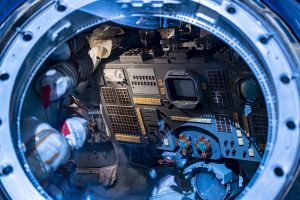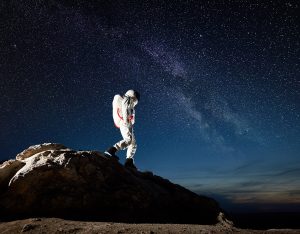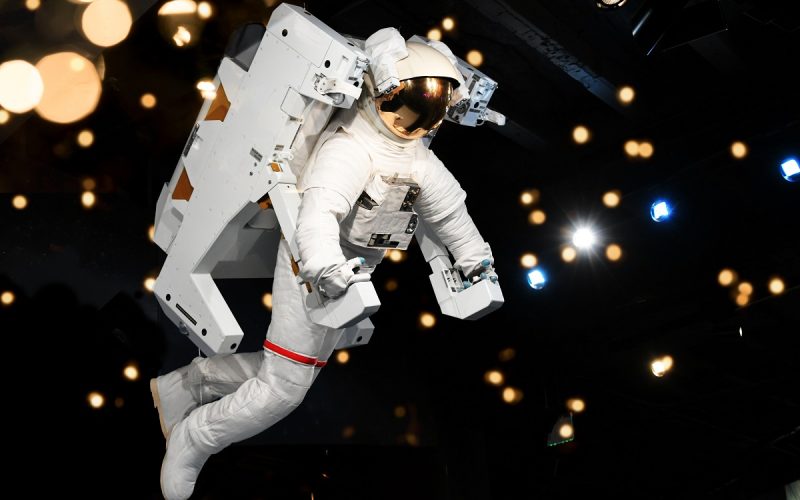Astronauts train intensely to build essential skills, teamwork, and mental strength for their missions. Support systems help them stay focused, and training evolves as space exploration moves forward. Their commitment motivates us to value learning and adaptation.
Psychological Support Systems
Astronauts undergo thorough psychological training to manage isolation and stress during space missions. This training includes spacecraft simulations, team-building exercises, and techniques to build mental strength, making sure that crew members are prepared for the challenges of long-duration space travel.
1. Importance of Mental Health
 Mental health is important for astronauts due to the unique stressors they face, like isolation during long flights. Stress management training builds resilience, and continuous support from mission control is vital for maintaining the well-being of astronauts throughout their missions.
Mental health is important for astronauts due to the unique stressors they face, like isolation during long flights. Stress management training builds resilience, and continuous support from mission control is vital for maintaining the well-being of astronauts throughout their missions.
2. Counseling and Therapy Options
Astronauts, whether commercial or government astronauts, receive personalized counseling, including individual and group therapy, to manage stress during spaceflight preparation. Remote support through telehealth and mindfulness techniques further help astronauts cope with the demands of long missions.
3. Communication with Family
Staying connected with family is key for astronauts during their missions. Regular video calls and messages support their emotional well-being and help them stay connected with home. A space for astronauts to discuss family-related stress is important for maintaining strong support systems, which improve their success in long-duration space missions.
4. Monitoring Psychological Well-being
Astronauts use self-assessment tools to manage their mental health during missions, particularly on extended flights. Real-time monitoring and regular check-ins with flight surgeons allow mission control to address concerns and refine support strategies for astronauts, enhancing their mental health awareness.
Preparation for Space Missions
Astronauts undergo rigorous training to prepare for space travel, which builds both physical and mental resilience. This preparation helps foster teamwork and clear goal-setting, while high-altitude simulations prepare astronauts for the challenges they will face during future missions.
Physical Fitness Regimens
Astronauts follow personalized fitness routines that include strength training, cardio, and flexibility exercises to prepare for the demands of space travel. Regular health checks fine-tune these workouts for long missions. For example, pilot astronauts spend 15 hours a month flying NASA’s T-38 jets to stay fit and sharp.
Simulated Space Environments

Simulations are an important part of astronaut training, especially for commercial space missions. Mock-ups replicate microgravity and confined spaces, and virtual reality helps astronauts practice spacecraft operations.
Underwater training allows astronauts to get used to weightlessness, and their performance is closely monitored for improvement. To ensure readiness for missions, astronauts start with general training software and gradually move to mission-specific simulations up to 10 months before their flight.
Coping Mechanisms Training
Stress management is key for astronauts, especially during long missions. They use techniques like deep breathing and visualization to develop personalized mental health plans. Instructors also encourage regular self-assessment and behavioral health check-ins to help astronauts stay resilient in the face of challenges.
Training Processes for Astronauts
Training astronauts is demanding, particularly for long-duration space missions. It includes a structured program that covers technical, physical, and psychological training, preparing astronauts to handle the extreme conditions of space and become well-rounded space explorers.
- Technical Skills Development: Astronauts develop important technical skills for spacecraft operation and problem-solving during missions. They practice troubleshooting under pressure using real-world scenarios and advanced simulations, gaining hands-on experience that strengthens overall crew performance.
- Emergency Response Drills: Space missions are unpredictable, so emergency response drills are a top priority. Simulations like cabin depressurization and equipment failures test astronauts’ ability to handle crises and reveal areas for improvement. These drills help ensure astronauts stay calm and respond efficiently to emergencies.
- Team Dynamics and Collaboration: Teamwork is vital to mission success. Collaboration among astronauts is critical, as team dynamics have a significant impact on outcomes. Team-building activities strengthen trust and communication, helping create a cohesive unit needed for safe space missions. Regular assessments of team dynamics ensure training and missions stay on course.
Future of Astronaut Training
New technologies like virtual reality (VR) and augmented reality (AR) are changing the way astronauts are trained for commercial space missions. VR headsets allow astronauts to practice in environments similar to the International Space Station, improving engagement and preparing them for unexpected scenarios.
Artificial intelligence (AI) and machine learning (ML) also analyze performance data to offer tailored feedback. Collaborations with educational institutions are key to improving these methods.
Emerging Technologies in Training
As technology advances, astronaut training for future missions becomes more sophisticated. Virtual and augmented reality provide realistic spaceflight simulations, and wearables monitor physiological responses, offering insights into how the body handles stress and microgravity. These advancements help improve training for commercial astronauts.
Personalized Training Approaches
 Personalized training is vital for improving astronaut performance. By tailoring programs to individual strengths and weaknesses and providing continuous feedback, space agencies can ensure astronauts are ready for the unique challenges of exploration missions.
Personalized training is vital for improving astronaut performance. By tailoring programs to individual strengths and weaknesses and providing continuous feedback, space agencies can ensure astronauts are ready for the unique challenges of exploration missions.
Advancements in Psychological Support
Mental health is as important as physical fitness for astronauts, especially during long missions. Staying up-to-date with advancements in spaceflight preparation is critical to providing the right support.
By integrating new research and working with aerospace psychologists and space medicine experts, we can develop effective strategies to help astronauts tackle the challenges of space exploration.
Reach For The Sky!
Space is more than just a fun adventure—it’s an area of intense preparation for commercial space missions. Astronauts train hard to face the unknown, using technology and courage to push the boundaries of human exploration.
They master equipment, learn survival skills, and stay calm under pressure. We dive into their training and the future of space exploration. It’s not just about the stars; it’s about the journey. Curious?
Stay informed with Kiddie Chronicle for the latest updates and insights on how astronauts prepare for space missions, and get inspired to tackle your own challenges. Start your journey today!

